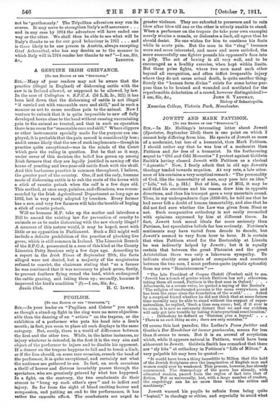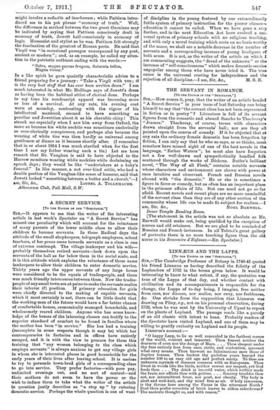JOWETT AND MARK PATTISON. [To TEE EDITOIt OF TIM "
SPECTATOR.") SIR, —In Mr. Hollings's interesting letter about Jowett (Spectator, September 23rd) there is one point on which I
cannot help differing from him. He speaks of Jowett as more
of a modernist, but less of a humanist, than Mark Pattison. I should rather say that he was less of a modernist than Pattison and far less of a humanist. In the forthcoming sequel to " Old and Odd Memories " I protest against Goldwiu Smith's having classed Jowett with Pattison as a clerical
"Agnostic." Now, I freely admit that in old age Jowett's theology tended towards negation. At any rate, a late utter- ance of his contains a very sceptical remark : "The personality of God, like the immortality of man, may pass into an idea,." (" Life," vol. ii., p. 311.) But of him, as of Mill, it may be said that his emotions and his reason drew him in opposite directions, and thus his trumpet gave a very uncertain sound. Thus, in my undergraduate days (1856-60), he told me that he had never felt a doubt of human immortality, and also that he did not feel sure whether the Law was given from Sinai or not. Such comparative orthodoxy is not easily reconciled with opinions expressed by him at different times. In fact, Jowett took moral ideals far more seriously than Pattison, but speculative beliefs far less seriously. Pattison's sentiments may have varied from decade to decade, but
Jowett's seemed to vary from hour to hour. It is certain
that when Pattison stood for the Rectorship at Lincoln be was indirectly helped by Jowett ; but it is equally certain that between the great Platonist and the great Aristotelian there was only a lukewarm sympathy. To indicate shortly some points of comparison and contrast between the two men, I must perforce quote (aptatis aptandis) from my own "Reminiscences " :—
" The late President of Corpus Christi (Fowler) said to me, 'Jowett has a touch of genius which Pattison has not ; otherwise, taking them all round, Pattison is the first man in Oxford? . . • Afterwards, in a severe voice, he quoted a saying of the Rector's The religion of uneducated persons is the same everywhere, and has been the same since the foundation of the world.' . . . Asked by a sceptical friend whether he did not think that at some future time morality may be able to stand without the support of super- naturalism, he replied, 'Such a time may come ; but, if it ever is to come, it is now so extremely distant that we and our children will only get into trouble by taking it into practical consideration.' . . . Orthodoxy he defined as Stoicism plus a legend.' . . . Them is no such thing as sin; there are only mistakes.
Of course this last paradox, like Luther's Pecca fortiter and Goethe's Der Handelner ist immer gewissenlos, means far less than it seems to mean. But it is an avowal of scepticism which, while it appears natural in Pattison, would have been abhorrent to Jowett. Goldwin Smith has remarked that there
are "sly hits" at orthodoxy in Pattison's "Life of Milton." A very palpable bit may here be quoted :— " It would have been a thing incredible to Milton that the hold of the Jewish Scriptures over the imagination of English men and women could ever be weakened. This process, however, has already commenced. The demonology of the poem has already, with educated readers, passed from the region of fact into that of fiction. Not so universally, but, with a large number of readers, the angelology can be no more than what the critics call machinery."
Jowett warned his pupils to refrain from being quite "logical," in theology or ethics, and especially to avoid what
might involve a redv,ctio ad inurbanum ; while Pattison intro- duced me to his pet phrase "economy of truth." Well, the difference in method between the two great Oxonians may be indicated by saying that Pattison consciously dealt in economy of truth, Jowett half-consciously in economy of logic. Humanist and stylist as he was, Pattison felt strongly the fascination of the greatest of Roman poets. He said that Virgil was " in occasional passages unsurpassed by any poet, ancient or modern"; and, as an example, he called my atten- tion to the patriotic outburst ending with the words:—
"Salve, magna parens frugum, Saturnia tellus, Magna virum."
In a like spirit he gave quaintly characteristic advice to a friend preparing for a journey : "Take a Virgil with you; it is the very best stuff that has ever been written down." I am much interested in what Mr. Hollings says of Jowett's dress as having been the habitual attire of clerical dons. Perhaps in my time his nondescript apparel was becoming more or less of a survival. At any rate, his evening coat worn at noonday, contrasting with the vigour of his intellectual manhood, seemed to have something as peculiar and Jowettian about it as his cherubic chirp ! This struck me especially when I saw him away from Oxford, the more so because his white necktie was sometimes unclerically or over-clerically conspicuous, and perhaps also because the wearing of white ties was then hardly as universal among gentlemen at dinner as it became shortly after. (I remember that in or about 1854 I was much startled when for the first time I saw my father wearing such a tie.) Let me here remark that Dr. Vaughan is said to have objected to the Harrow monitors wearing white neckties while declaiming on speech days ; they would be like "undertakers at a baby's funeral." In like manner, a not over-kind critic, who had a double portion of the Vaughan-like sense of humour, said that Jowett looked " something between a butler and a cherub."—I































































 Previous page
Previous page